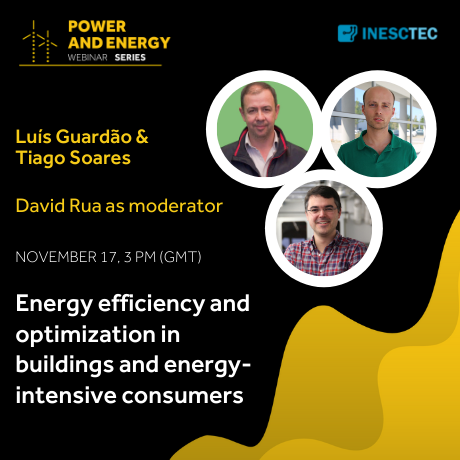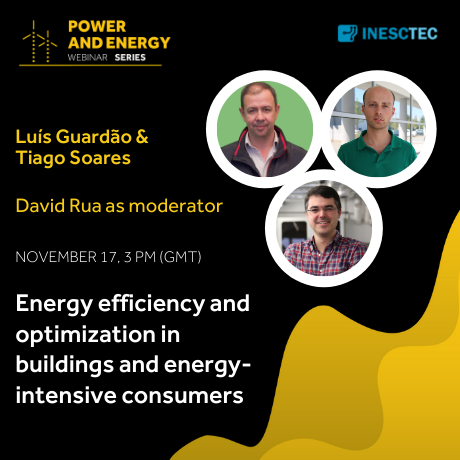Power & Energy Webinar Series - Energy efficiency and optimization in buildings and energy-intensive consumers
A décima edição da iniciativa “Power & Energy Webinar Series” decorre na próxima quarta-feira, dia 17 de novembro, a partir das 15 horas, sob o tema “Eficiência e otimização energética em edifícios e consumidores intensivos de energia”.
Luís Guardão e Tiago Soares - investigadores do INESC TEC -, serão os oradores. A moderação estará a cargo de David Rua, investigador sénior do Centro de Sistemas e Energia do INESC TEC.
A última parte de cada apresentação será dedicada ao debate entre oradores e participantes.
Os interessados em participar na sessão devem inscrever-se no site: http://energywebinars.inesctec.pt/. Após o preenchimento do formulário disponibilizado (secção “participar”), os participantes receberão, mais próximo da sessão, um e-mail da organização com as credenciais de acesso.

About the presentations:
Luís Guardão: Minimizing manufacturing production costs: The role of intelligent scheduling
Being efficient and thus reducing manufacturing production costs has always been of paramount importance to industrial companies as a path to increase profits.
Although modern and more efficient machines and ancillary equipment play an important role to that objective, operations planning and scheduling have become more and more important as product mix has increased and specialized human resources and tools need to be managed in a more flexible way in order to retain efficiency. The ever increasing cost of energy has fostered the need to look into more detail into the manufacturing production processes, studying them and deriving knowledge that will directly or indirectly improve process energy efficiency.
We'll be looking at some real world examples on how these tools and techniques have been applied in industries with relevant results.
Tiago Soares: The Active Building Energy Performance Contract concept
This presentation focuses on the aspects of Active Building Energy Performance Contract (AEPC) that are specifically considered as an extension to the classic Energy Performance Contracting (EPC). A comprehensive definition of AEPC is introduced highlighting the core intentions of AEPC in supporting the electrification and CO2 emission reduction measures in the building sector. The main achievement of electrification in the building sector along with the recent technologies is the improved smartness level, which both can effectively contribute to the obtainable flexibility level from a building. Although investing in flexible resources (such as solar panels, electric vehicle charging, energy management systems, etc.) is currently considered in the classic EPC procedure, the availability and responsiveness of the flexibility in the buildings have not been the focus. Therefore, using the AEPC’s approach would result in a new value chain for energy performance contracting. The main idea behind the concept of AEPC revolves around the addition of demand response (DR) to the procedure of energy performance contracting with a purpose of deploying the available flexibility in the buildings (already existing ones or through renovation) in a meaningful way that brings new value streams to the EPC business model.
About the speakers:
Luís Guardão, senior researcher at INESC TEC Centre for Enterprise Systems Engineering (CESE)
Luís started his work at this institution back in 1992 as a software developer and systems database administrator. Soon, in 1995, he embraced the project manager role and have since then led a large number of projects in multiple domains (Operations Management, Internal Logistics, Automation, Knowledge Management, Systems Architecture Integration, Planning Scheduling, Benchmarking Business Intelligence) and industries (Shoe, textile, metal tooling, Civil Construction, Chemical, Architecture, Government, Universities).
Luís hold a Degree in Electronics and Telecommunications by the University of Aveiro and postgraduates degrees in Management (by EGP-UP) and Medical Informatics (by the Faculty of Medicine and Faculty of Sciences of UP).
His current main research area of interest at INESC TEC is Integrated Planning Scheduling in the context of Industry 4.0.
Tiago Soares, senior researcher at INESC TEC Centre for Power and Energy Systems (CPES)
Tiago Soares received the M.Sc. degree in electrical engineering from the School of Engineering of Polytechnic Institute of Porto (ISEP), in 2013 and the Ph.D. degree in electrical engineering from the Technical University of Denmark (DTU) in 2017. He is currently postdoc at the INESC TEC, Centre for Power and Energy Systems. His research interests include electricity markets, distributed generation, energy resources management and optimization, optimization under uncertainty and future power systems.
About the moderator:
David Rua, senior researcher at INESC TEC Centre for Power and Energy Systems (CPES)
Senior researcher in the Centre for Power and Energy Systems (CPES). David`s research interests include modelling and optimization of flexible energy resource, digital platforms and systems for grid management, and control and demand response strategies for residential and non-residential buildings. He currently leads the x-Energy Management Systems area in CPES.


